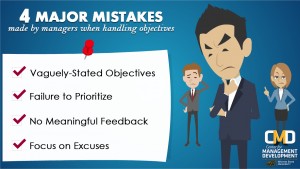 Being accountable is being responsible for your actions and decisions while accomplishing the expectations of your role. Accountability implies consequences. Failure to achieve expectations may result in punishments. Likewise, success earns rewards.
Being accountable is being responsible for your actions and decisions while accomplishing the expectations of your role. Accountability implies consequences. Failure to achieve expectations may result in punishments. Likewise, success earns rewards.
When leaders fail to obtain their team’s expectations, it is usually because they have made one or more of the following mistakes.
Vaguely-Stated Objectives.
General statements such as, “operate efficiently,” “improve quality,” and “provide excellent customer service” have little meaning to team members.
Vaguely-stated objectives mean different things to different people. To be accountable and to hold members accountable, objectives need to be specific and measurable.
More specific objectives include statements such as: “Ship on time 98% of the time,” “defects of less than 1.5%,” and “score 90% ‘strongly agree’ on customer surveys.”
Failure to prioritize.
Sometimes, it is impossible for a decision to serve all of the objectives. Suppose a customer submits a passionate claim on an item that is just barely out of warranty. Which is the greater priority? Is it customer service or is it cost containment?
Unless the objectives are prioritized, the member faces a dilemma. If the member approves the warranty claim, he/she may be held accountable for allowing costs to increase. If the member does not approve the warranty claim, he/she may be held accountable for contributing to poor customer service scores.
Leaders who clearly prioritize objectives can more appropriately hold themselves and their team members accountable.
No Meaningful Feedback.
Accountable people self-monitor their behaviors. If their current behaviors do not achieve the desired results, they change them. Unfortunately, too many leaders fail to keep their members informed in timely manner about slippages in their achievements.
Accountable leaders present weekly, even daily, feedback (often in the form of charts and graphs) on how well the team is doing.
Focus on Excuses.
Mistakes happen. Future challenges are unpredictable. Some leaders try to avoid accountability by putting forth great effort to document the reasons for failure.
Accountable leaders understand that failures occur, and they apply their efforts to suggesting improvements that would prevent future short comings. As one CEO commented, “Just because you can explain why your team failed does not mean that you get to keep your job.”
If you’re looking to enhance your management skills, check out our How to Become an Effective Manager course. In it, we explore and analyze the differences between effective and ineffective managers, and learn to be coaches that push exceptional performance by empowering employees.
 Dr. Gerald Graham is the R.P. Clinton Distinguished Professor of Management at Wichita State University, and has received the Kansas Regents’ “Excellence in Teaching Award.” A renowned writer, Dr. Graham has authored four textbooks, titled, “Management: The Individual, The Organization, The Process”, “Business: The Process of Enterprise”, “Understanding Human Relations”, and “The World of Business.”
Dr. Gerald Graham is the R.P. Clinton Distinguished Professor of Management at Wichita State University, and has received the Kansas Regents’ “Excellence in Teaching Award.” A renowned writer, Dr. Graham has authored four textbooks, titled, “Management: The Individual, The Organization, The Process”, “Business: The Process of Enterprise”, “Understanding Human Relations”, and “The World of Business.”
